Rolls-Royce secures navy contracts

Rolls-Royce has secured two separate contracts worth a total of £9.5m to supply propulsion and motion control systems to the French and South Korean navies.
The French order, worth £7.5m, is for the supply of podded propulsion equipment and stabilising fins for the latest French Navy Mistral-class amphibious assault ship, expected to enter service in 2012. This follows a contract to supply podded propulsors and stabilisers on the first two ships in the class: Mistral and Tonnerre.
The group’s Mermaid Pod is a propulsor and steering device incorporating two electric motors housed within two steel pods that are mounted on the hull of the ship. The pods act as a rudder to steer the ship, while a motor supplied by French power conversion group Converteam will drive the propeller.
The system incorporates stabilising fins that are retractable and can be deployed from their housing in the ship’s hull during rough sea conditions. Once deployed, the stabilisers pivot to counteract the roll of the sea to lift the vessel in a similar way to an aircraft wing.
Register now to continue reading
Thanks for visiting The Engineer. You’ve now reached your monthly limit of news stories. Register for free to unlock unlimited access to all of our news coverage, as well as premium content including opinion, in-depth features and special reports.
Benefits of registering
-
In-depth insights and coverage of key emerging trends
-
Unrestricted access to special reports throughout the year
-
Daily technology news delivered straight to your inbox










Water Sector Talent Exodus Could Cripple The Sector
Maybe if things are essential for the running of a country and we want to pay a fair price we should be running these utilities on a not for profit...